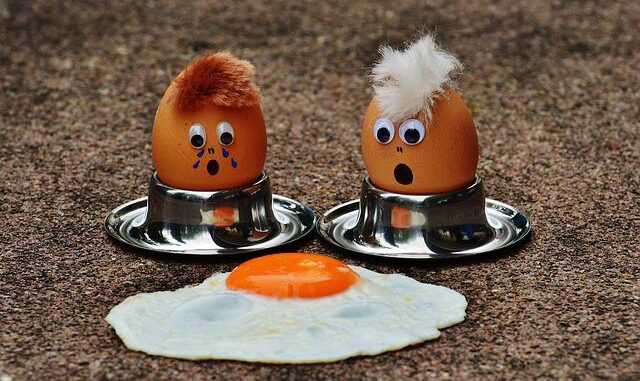
The Nutrition and Health Benefits of Eggs
How Many Calories Does Eggs Have?
how many calories does eggs have? Eggs are a great source of protein and other nutrients. They are also a great breakfast food that you can enjoy anytime of the day. Eggs are a staple in many diets for their versatility and nutritional properties.
They can be boiled, scrambled, fried, or poached. The calories in eggs depend on how you cook them and what type of egg you eat. A whole egg contains about 70 calories and 6 grams of fat.
A large egg has about 55 calories with 5 grams of fat. A medium egg has about 45 calories with 4 grams of fat while scrambled eggs have around 60-70 calories with 5-6 grams of fat depending on how much butter is used in the cooking process. .
How many calories does a boiled egg have?A boiled egg has about 70-45 grams of protein, depending on the size. A whole egg is made up of 6 grams of fat and 4 grams of protein while an egg large has 5 grams and a medium is around 4-5. grams.3,500 calories
What is the Definition of an Egg?
Eggs are a great source of protein, vitamins, and minerals. They also contain choline which is an essential nutrient for brain function.
Eggs are not just a breakfast food anymore. The best thing about eggs is that they can be eaten at any time of the day and for any meal. Eggs are also a great source of protein, vitamin D, riboflavin, selenium and potassium.
What Are the Health Benefits of Eggs?
Eggs are a great source of protein and they are also low in calories.
There are a lot of benefits to eating eggs, but there are some people who avoid them because they think that eggs contain cholesterol or gluten. The truth is that eggs have neither of these things. Eggs do not contain any gluten and they only have about 6 grams of cholesterol in one egg.
Eggs are a great source of protein and a good source of vitamins, minerals and healthy fats. They are also a great breakfast food.
Some people believe that eggs can be eaten raw or that they contain gluten. However, these claims are not true.
Eggs Nutrition Facts & Nutrients Breakdown
Eggs are a good source of protein, vitamins, and minerals. They are also low in calories and cholesterol.
Eggs are a great source of protein and contain vitamins such as D, B2, B12, A, E and K. They also have minerals including potassium which is essential for the body to maintain fluid balance in the cells and tissues. Eggs are a great breakfast food as they’re high in protein which can help you stay full until lunch time.
Eggs have been deemed unhealthy because they contain high cholesterol levels but this is not true at all. In fact eggs actually contain less cholesterol than beef bacon or sausage! Eggs also provide good amounts of omega-3 fatty acids which help reduce inflammation in the body – something that’s linked to heart disease and other chronic conditions like
#1. How Many Calories are in One Egg?
Eggs are a great source of protein and other nutrients. They are also a great breakfast option for those on the go.
Eggs have many benefits, but how many calories do eggs have? An egg has about 70 calories, which is not too bad for a breakfast item. One egg will give you about 6 grams of protein, which is also good to know if you are trying to get more protein in your diet.
#2. Why Would a Person Eat Eggs? how many calories does eggs have?
Eggs are one of the most nutritious and versatile foods, so it’s no wonder that they are a staple in many healthy eating plans.
Eggs provide all nine essential amino acids, which is why they are often called a “complete protein.” They also contain high-quality fat and cholesterol, which is important for many bodily functions.
They are inexpensive and widely available. Eggs come in a variety of sizes, colors and flavors, making them an easy ingredient to add to any meal.
#3. What Are the Different Types of Cooked Eggs?
There are many different types of eggs. They each have their own cooking time, texture and taste.
Boiled: Boiling is the most common way to cook eggs. This method is easy and quick, so it’s great for a quick breakfast or for when you’re in a hurry. The downside to boiling eggs is that they can be rubbery if overcooked or undercooked.
Fried: Fried eggs are often served with breakfast foods like bacon, ham and toast. The egg yolk turns into a creamy sauce that mixes well with the other ingredients on the plate. Fried eggs are also easy to make in bulk because they don’t require much attention while cooking.
Poached: Poaching is a gentle way of cooking an egg by placing it in simmering water and stirring the water so that it simmers the egg slowly. Poaching is a great method for cooking eggs if you’re working with delicate ingredients or if you want to make a creamy egg dish like chiffonade.
Scrambled: Scrambled eggs are very versatile and can be used as a base for multiple dishes.
This is what most people think of when they think of scrambled eggs. Scrambled eggs can be made by hand, in a frying pan or in an omelette maker.
[clickbank-storefront-popular]
Leave a Reply